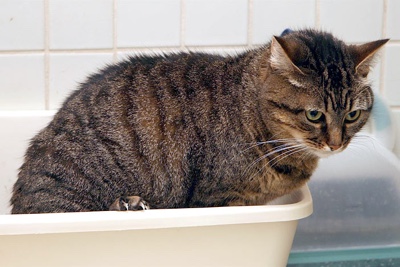You are taking it easy one night and watching TV-6 or maybe enjoying a nice dinner you prepared. While you are winding down for the evening, you hear your cat howling in the house. You head over to it’s litter box and notice that the cat seems to be straining in the litter box. Around the litter box is multiple, very small puddles of urine with what looks like blood mixed in it. A situation like this means your cat may have a bladder infection or is very likely partially or fully blocked and should seek urgent veterinary care.
A cat could be blocked for multiple reasons. The most common urinary plug consists of a mix of proteins, cellular waste, and crystallized minerals. Other types of plugs could be urinary stones and (even less common) tumors. Cats that are blocked will urinate frequently or strain to urinate, vocalize while urinating, show blood in their urine, and may have a loss of appetite. In more severe cases, a feline might vomit and become dehydrated. Male cats are the most susceptible to developing blockages due to their longer and more narrow urethras compared to female cats.
If you suspect your cat may be blocked, it is important to bring them in to seek immediate veterinary care. If the blockage is not resolved, a cat may go onto develop life-threatening renal and/or heart-rhythm abnormalities and could perish within days. As a veterinarian, we will diagnose this issue based on physical examination, history, a urinalysis, and/or x-ray/ultrasound of the bladder.
In regards to treatment, we will normally administer fluids to correct for electrolyte abnormalities and then attempt to catheterize the urethra to break up the blockage and flush the bladder. If catheterization is unsuccessful, then surgery will be required to remove the blockage. Aftercare is normally aimed at putting a cat on a prescription-based diet focused on urinary care to help reduce the formation of plugs which can easily cause a re-blockage. In a very low percentage of cases, even the prescription based foods may not help stop recurrent blockage problems and these cats need to have a specialized surgery to keep them from blocking.
For all my feline owners out there, I ask you to keep a close eye on your cat if they start to show those signs I previously mentioned. If we can catch and treat a blocked cat sooner rather than later, they will carry an excellent prognosis and go on to continue to living their normal, happy, healthy lives. Dr. Edward G. Brauer III


Recent Comments